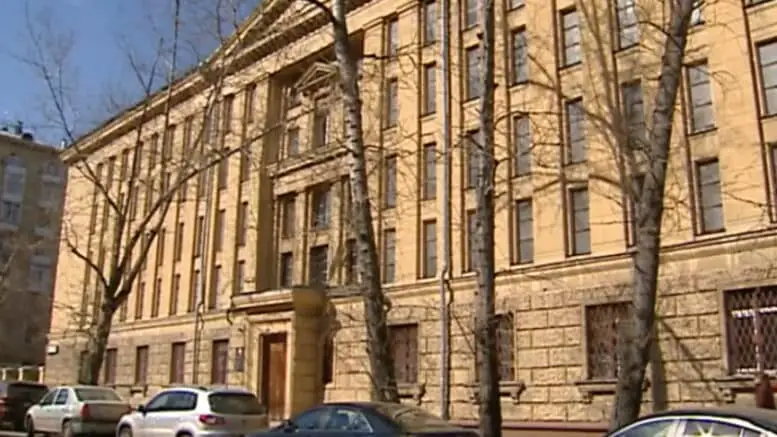The Russian State Archive of Literature and Art (Российский государственный архив литературы и искусства) is Russia’s largest repository of materials on the history of Russian literature, music, theater, cinema, visual arts, and architecture. Founded in 1941 as the Central State Literary Archive, specialized fonds were transferred from the State Literary Museum, Central State Archive of the October Revolution, The State Historical Museum, The Central State Archive of Ancient Records, the State Tretyakov Gallery, and other archives.
RGALI, as it is often known even in English, has files on Russian culture and the various stages of the development of Russian literature, art, social thought, as well as on cross-cultural contacts between Russians and foreigners. Fonds include those from the central government in the field of culture as well as from theaters, film studios, specialized educational institutions, publishing houses, public organizations. Also available are personal fonds of writers, critics, artists, composers, theater and film workers and other collections of documents.
Overall Experience
Researchers report that RGALI has some of the most efficient administration of all Moscow archives. The reading room supervisor is helpful, including over email.
Prep Beforehand
RGALI has an on-line database with extensive information on its holdings.
To order materials from RGALI in advance, a scholar should send an email a week prior to his/her arrival, and attach official letter from institution to the email. The email should be as follows:

К Вам обращается (NAME, POSITION).
Я провожу исследование (NAME OF RESEARCH, PURPOSE).
В рамках этой работы я планирую приехать в Москву и заниматься исследованием документов в РГАЛИ (DATE) этого года.
Прилагаю официальное письмо от моего университета.
Обращаюсь с просьбой предоставить к моему приезду (ARRIVAL DATE) и приходу в РГАЛИ мне следующие документы:
Р5673 1: Name of file. Date of file
С уважением,
(NAME)
Getting a Propusk
Documents needed: Passport. A letter from the researcher’s institution. A passport photo.
Time: 10 minutes
RGALI has two reading rooms. Reading room number 1 is in the “main” building (not visible from the street, behind the building that houses the military archive), propusk should be obtained in reading room number 1; reading room number 2 is in the older of the military archive’s two buildings.
Institution letter template (should be on official letterhead):
(DATE)
Директору Российского государственного архива литературы и искусства Ольге Александровне Шашковой
Уважаемая Ольга Александровна,
Прошу Вашего разрешения на ознакомление с материалами архива (RESEARCHER’S NAME, TITLE, POSITION), в рамках темы (ее/его) исследования (RESEARCH NAME, PURPOSE (DISSERTATION, BOOK, ETC)).
С уважением,
(TITLE, NAME, POSITION OF INSTITUTION OFFICIAL)
Working the Archive
Working days between requesting delo and receipt: 3
Maximum delo that can be requested at one time: Unlimited, in principle
Price for making copies:
Microfilm Copies:
Photos from the microfilm projector may be made, with permission, for 14-43 rubles per pictures, depending on the age and type of document. Paper copies will run from 79 rubles per copy.
Document Copies:
Prices vary according to the age and type of document. Photos may be taken, with permission, for 14-56 rubles each. Photocopies can be ordered for 47-53 rubles each and may take up to a month to process. Scans can run from 44-207 rubles each and generally take less time to process in addition to being of higher quality. Some very old documents may be available for only scans.
Scheduling practices:
After reopening after its closure for COVID, the following policy was put in place:
To visit RGALI reading room for microfilms, a researcher must make an appointment by calling 8(499)156-69-52). A researcher generally is able to get access to RGALI reading room for microfilms within a few days.
To visit RGALI reading room for manuscripts, a researcher must make an appointment by calling 8(499)159-75-13. Appointments for the RGALI reading room for manuscripts are available about 10 days after calling for an appointment.
Problems: if you hear of any, let us know.
What’s it like to work in Russia’s Archives? What’s it like to work with SRAS’ custom Research Abroad Services? Find out more in the video below.
Logistics
Address: Vyborgskaya Street 3 korp. 2 (Vodny Stadion metro station).
Phone: (499) 159 76 85, (499) 159 73 81
Website: click here
Special working hours: RGALI is working in “shifts,” with one in the morning, followed by a “disinfection hour,” followed by a second shift. Time slots are contained within these shifts. Current hours are as follows:
Monday, Tuesday: 9:00-13:00 and 14:00-19:00,
Wednesday, Thursday: 9:00-13:00 and 14:00-17:00,
Friday: 9:00-13:00 and 14:00-15:00,
First working day of each month – closed (sanitarny den).



